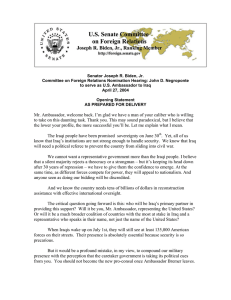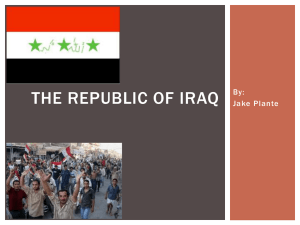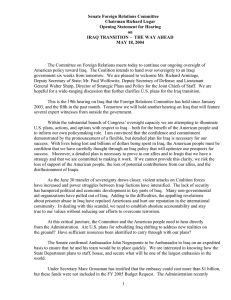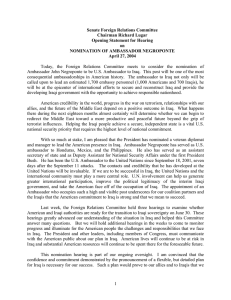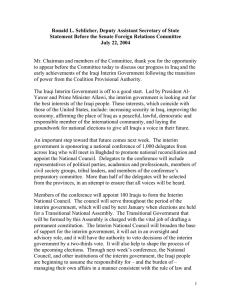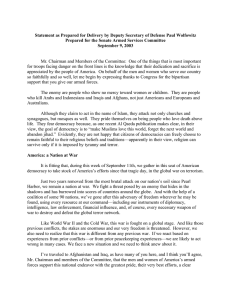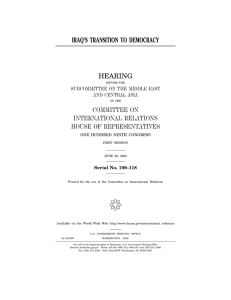Senator Joseph R. Biden, Jr. Opening Statement Iraq - Next Steps
advertisement
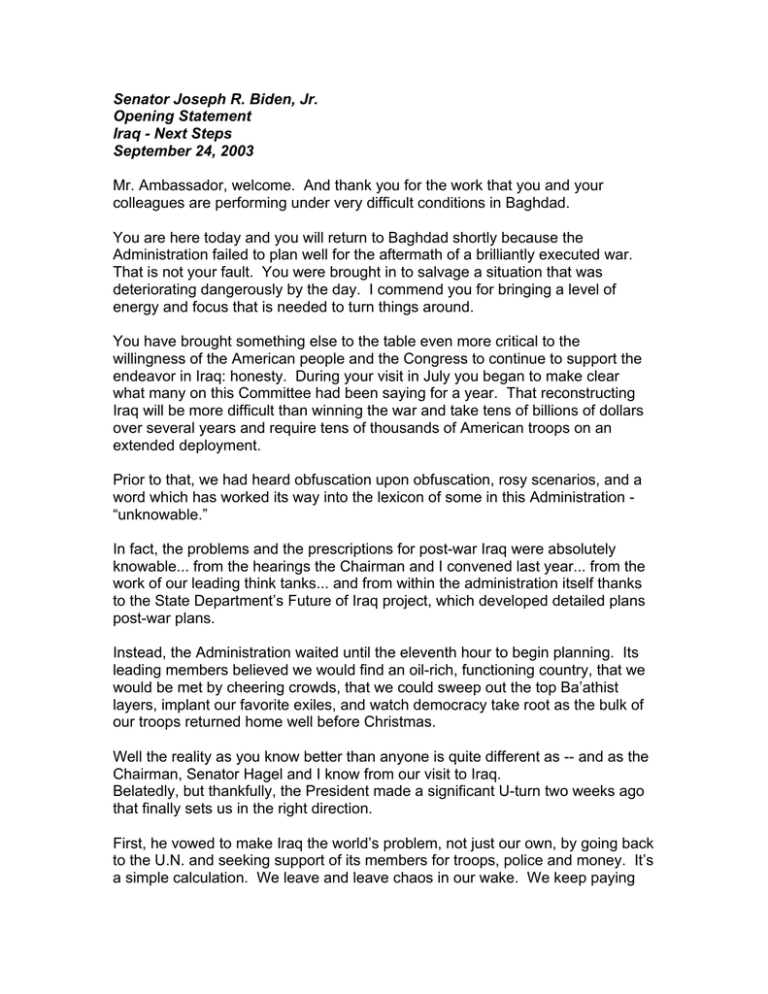
Senator Joseph R. Biden, Jr. Opening Statement Iraq - Next Steps September 24, 2003 Mr. Ambassador, welcome. And thank you for the work that you and your colleagues are performing under very difficult conditions in Baghdad. You are here today and you will return to Baghdad shortly because the Administration failed to plan well for the aftermath of a brilliantly executed war. That is not your fault. You were brought in to salvage a situation that was deteriorating dangerously by the day. I commend you for bringing a level of energy and focus that is needed to turn things around. You have brought something else to the table even more critical to the willingness of the American people and the Congress to continue to support the endeavor in Iraq: honesty. During your visit in July you began to make clear what many on this Committee had been saying for a year. That reconstructing Iraq will be more difficult than winning the war and take tens of billions of dollars over several years and require tens of thousands of American troops on an extended deployment. Prior to that, we had heard obfuscation upon obfuscation, rosy scenarios, and a word which has worked its way into the lexicon of some in this Administration “unknowable.” In fact, the problems and the prescriptions for post-war Iraq were absolutely knowable... from the hearings the Chairman and I convened last year... from the work of our leading think tanks... and from within the administration itself thanks to the State Department’s Future of Iraq project, which developed detailed plans post-war plans. Instead, the Administration waited until the eleventh hour to begin planning. Its leading members believed we would find an oil-rich, functioning country, that we would be met by cheering crowds, that we could sweep out the top Ba’athist layers, implant our favorite exiles, and watch democracy take root as the bulk of our troops returned home well before Christmas. Well the reality as you know better than anyone is quite different as -- and as the Chairman, Senator Hagel and I know from our visit to Iraq. Belatedly, but thankfully, the President made a significant U-turn two weeks ago that finally sets us in the right direction. First, he vowed to make Iraq the world’s problem, not just our own, by going back to the U.N. and seeking support of its members for troops, police and money. It’s a simple calculation. We leave and leave chaos in our wake. We keep paying for everything in tomes of lives and resources. Or, we get others to share the burden. I regret that his speech to the U.N. yesterday missed an opportunity to rally the world to this cause. He should have made clear our willingness to bridge the differences with our allies on a new U.N. resolution and to grant the U.N. real authority, laid out some specifics, and asked - asked - for help. Not apologize he had nothing to apologize for - but ask. So I’m left questioning the sincerity of the President’s mid-course correction. If we want the world to share the burden, we’ve got to share authority in Iraq in meaningful way. The payers want to be players. And I can’t believe we can’t find a compromise that meets our rightful concerns about a premature transfer of power, but that also empowers the U.N. and starts to put more power in the hands of the Iraqi people. For example, what about “double hatting” you as the representative of the international community. Instead of reporting to Mr. Rumsfeld, you’d report to an international board of directors, with the U.S. as chairman of that board because we’d be putting the most into the pot. What’s wrong with that? Second, the President began to level with American people about the hard road ahead to win the peace in terms of time, troops and treasure. I hope the Administration continues to level with the American people. It’s the only way to sustain their support. But the approach to the Supplemental concerns me on this account too. Mr. Ambassador, in your testimony before the Senate Appropriations Committee on Monday, you noted that the World Bank estimates the total cost of reconstruction to be about $60 to $70 billion over the next four to five years. The supplemental request covers $20 billion of that total. That begs a critical question: where is the remaining $40 to $50 billion going to come from? Will it come from the international community? Normally, that would be a reasonable expectation: the United States typically covers about 25 percent of post-conflict reconstruction costs. By that ratio, we could expect about $80 billion from the international community for Iraq. But we so poisoned the well in the lead up to this war that no one expects the international community to provide more than two or three billion at the donors conference next month. That’s a terrible indictment of our foreign policy and a harsh example of the price of unilateralism. Will the missing money be generated by Iraq’s oil revenues? That’s what the administration led the American people to believe in fairness, you did not. In fact, if we’re lucky, oil exports will generate just enough money to pay for the government’s operating costs. Forget about oil paying for reconstruction. Will the missing money be generated by others parts of the Iraqi economy? Secretary Rumsfeld recently touted the potential of Iraq’s tourism industry. The banks of the Tigris may replace the Outer Banks as a destination of choice someday, but not any day soon. Or maybe the missing money will come from taxpayers when the Administration comes back to Congress next year or the year after to ask for more. If that’s the plan, tell us now. Mr. Ambassador, you know how critical it is for you to show Congress and the American people your plan for turning things around in Iraq if we are to give the Administration the money it now seeks. No one wants to be throwing money much less American lives - down a black hole. So we need to be convinced you have a workable plan with clear benchmarks, timetables and accountability. I don’t want to minimize the successes you’ve already achieved. The Chairman, Senator Hagel, and I saw some of them during our visit. We saw a local council meeting taking place - the hopeful beginnings of grassroots democracy. Schools are open around the country. Hospitals are caring for the sick. These are major achievements and we do not read about them or see them on t.v. But Mr. Ambassador, all of this progress is jeopardized by our failure thus far to get it right in two fundamental areas: security and basic services. And that failure is compounded by a huge expectations gap created when we toppled in three weeks a tyrant who had plagued the Iraqi people for three decades. The Iraqi people can’t understand why we can’t restore a sense of personal security, or turn the lights back on as quickly as we defeated Saddam. Just as important, they do not seem to know what we are doing about these problems and when things will get better. That sense of uncertainty threatens to erode their good will toward us. Yesterday we heard from Dr. Hamre, who was asked by Secretary Rumsfeld this summer to assess the situation on the ground. The report that his team produced spoke of the window of opportunity closing rapidly. And he made specific recommendations - echoed by a staff report this Committee prepared -- in key areas, including security, services, jobs, and communications. I’d like to know what has been done to adopt these recommendations. I am deeply concerned that the window Dr. Hamre referred to is almost closed. A New York Times story on September 17 entitled “Iraqis’ Bitterness Is Called Bigger Threat Than Terror” cited new intelligence assessments “warning that the United States’ most formidable foe in Iraq in the months ahead may be the resentment of ordinary Iraqis increasingly hostile to the U.S. military occupation” Later, it says “The defense officials spoke on condition of anonymity, saying they were concerned about retribution for straying from the official line. They said it was a mistake for the Administration to discount the role of ordinary Iraqis who have little in common with the groups Mr. Rumsfeld cited, but whose anger over the American presence appears to be kindling some sympathy for those attacking American forces” Mr. Ambassador, if this report is true, it is very bad news. I still believe that this is totally doable, but only if we act with urgency and only if we involve the international community and to make concessions about sharing power, to lend legitimacy to the effort and to share the enormous burden. We cannot afford to lose this. If we fail, our credibility and national security will be damaged badly, our enemies will be emboldened, and Iraq may become a failed state. If we succeed, we can begin to alter the strategic map of the region for the better, strengthen reformers throughout the Middle East, make an ArabIsraeli peace more likely, and put our enemies on the defensive. So, Mr. Ambassador, to save you the suspense - I intend to support giving you the resources you need to get the job done. But I have very specific questions about your plans, and, like most of my colleagues, I want answers before I give my formal consent. I look forward to your testimony. ###



